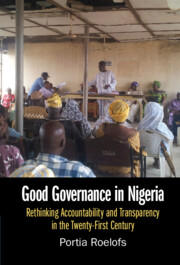Book contents
- Good Governance in Nigeria
- Good Governance in Nigeria
- Copyright page
- Dedication
- Epigraph
- Contents
- Figures
- Tables
- Acknowledgements
- Abbreviations
- Major Characters
- Map of Nigeria
- Additional material
- Introduction
- 1 Contested Legacies of Good Governance
- 2 Good Governance, What’s Not to Love?
- 3 Be Accessible! Accountability, Performance and the Politician Who Is ‘Always in a Meeting’
- 4 Theorising Accountability as Accessibility
- 5 Transparency in People
- 6 Socially Embedded Good Governance
- Conclusion
- Appendix: Methods and Methodology
- Glossary of Yoruba Terms
- Select Bibliography
- Index
2 - Good Governance, What’s Not to Love?
The Lagos Model in Lagos, Oyo and Ekiti States
Published online by Cambridge University Press: 13 April 2023
- Good Governance in Nigeria
- Good Governance in Nigeria
- Copyright page
- Dedication
- Epigraph
- Contents
- Figures
- Tables
- Acknowledgements
- Abbreviations
- Major Characters
- Map of Nigeria
- Additional material
- Introduction
- 1 Contested Legacies of Good Governance
- 2 Good Governance, What’s Not to Love?
- 3 Be Accessible! Accountability, Performance and the Politician Who Is ‘Always in a Meeting’
- 4 Theorising Accountability as Accessibility
- 5 Transparency in People
- 6 Socially Embedded Good Governance
- Conclusion
- Appendix: Methods and Methodology
- Glossary of Yoruba Terms
- Select Bibliography
- Index
Summary
This chapter introduces the ‘Lagos model’, a transformative package of pro-market developmental policies and reforms that was developed first in Lagos State, Nigeria, in 1999 and subsequently expanded to nearby Ekiti and Oyo. Under progressive Governors Bola Tinubu and Babatunde Fashola, the Lagos State Government reformed government agencies, introduced public–private partnerships, and oversaw an astronomical rise in the state’s tax base. In addition to serving as an effective strategy for building a political base for the opposition, the Lagos model won plaudits from international donors who saw it as a home-grown example of their good governance agenda. The spread of the Lagos model re-animated long-standing tensions in Yoruba politics, putting a vision of leadership rooted in epistemic superiority into conflict with a more socially embedded conception of legitimate rule. In the 2014 gubernatorial elections in nearby Ekiti state, the Lagos model was rejected in favour of its polar opposite. Whilst some have seen this as a straightforward material contest over the sorts of goods that governments should provide, this chapter argues that debates over the Lagos model reveal blind spots in dominant models of good governance.
Keywords
- Type
- Chapter
- Information
- Good Governance in NigeriaRethinking Accountability and Transparency in the Twenty-First Century, pp. 105 - 145Publisher: Cambridge University PressPrint publication year: 2023



